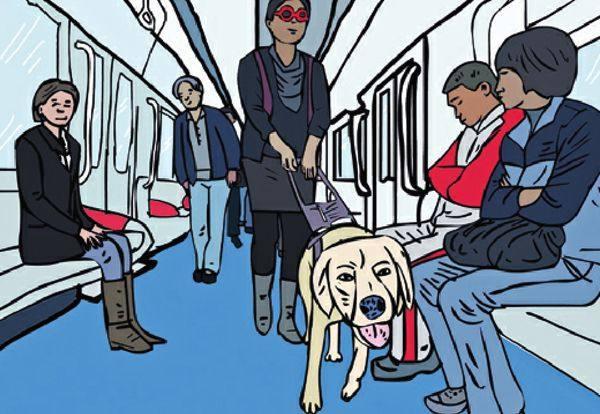Should Guide Dogs Be Allowed on Public Transport?
2013-04-29

A new regulation of Beijing Municipality states that trained guide dogs will be allowed to take public transport in the city, compared to previous drafts that forbid any dogs from public transport. Many see it as a big step forward in improving the lives of disabled people living in cities. At the same time, it should not be denied that dogs are likely to spread diseases and could frighten children.
China is now home to around 17 million blind people. With the improvement of peoples living conditions, more guide dogs are to be used. Thus, dealing with these dogs in terms of public transport is becoming an urgent problem and legal intervention is already unavoidable. The following are excerpts of opinions of the public:
Supporters
Sun Shuluan (Zhengzhou Evening News): Some people say that they are firmly against guide dogs being allowed public transport, no matter what kind of dogs the guide ones are and whether or not they attack people. They argue that some people are naturally afraid of dogs, and thus, its unacceptable to hurt the majoritys interests for the sake of the minority.
However, why are the blind treated in this way? Theyve already endured hardships and mishaps. They need more warmth and care from society. The blind should be granted some privileges, one of which is the right to bring their guide dogs with them wherever they go in public. This is a widely-accepted practice around the world. Its unfortunate that in China, due to selfishness or indiffer- ence to the difficulties that disabled people face, some people show no respect for disability rights.
Lei Hongpei (Beijing Youth Daily): Guide dogs are effectively a walking stick for blind people, and more than that, these dogs are an important part of disabled peoples life, ensuring their safety.
As for whether guide dogs should be allowed onto public transport: even if these dogs are likely to attack other passengers and may spread diseases or pose a threat to public security, they should be allowed to take public transport so long as they are vaccinated and wear mouth guards. Measures such as these can prevent incidents, so that these dogs owners may enjoy a more convenient public life. That is why it is required in Beijing that guide dogs must be “trained and qualified.” When this preparation work is done, allowing guide dogs onto public transport will make it much easier for the blind to travel around and other passengers will also feel more at ease when on the bus with such dogs. Thus, a balance is reached between blind people and the rest of the society.
Guide dogs deserve respect. They are mild in nature and will never attack others unless their owners are endangered. For a dog to be selected as a guide dog, there should be no record of attacking human beings or other dogs within seven generations. A qualified guide dog will “graduate” from school only after very strict training. To date, there is not even a single record of guide dogs attacking human beings.
Economic growth and social progress should also include more considerate care for social members with disabilities. Beijings permission to take guide dogs on public transport is a good example of this progress.
Zhang Shaoting (voc.com.cn): The embarrassment facing guide dogs mainly results from peoples misunderstanding of these dogs. Its therefore suggested that the media should do more to enhance peoples understanding of guide dogs. When more and more people begin to understand that guide dogs are not ordinary pets, but have received special training of 18 months for the purpose of guiding their blind masters, it will be much easier for blind people to take these dogs out into public places. Before most people understand the merits of guide dogs, its also necessary for authoritative departments to offer special certificates that can be hung on these dogs backs, so that people know the dogs are safe and have been vaccinated as well as having gone through special training.
Liu Peng (iqilu.com): Bus drivers have an obligation to ensure blind people and other disabled groups convenience while taking buses, but at the same time, drivers also have to look after other passengers on the bus. Some passengers still have doubts about guide dogs and thus hesitate to take the bus together with these dogs. Therefore, its understandable for public transport to refuse guide dogs in some cases.
However, its somewhat unreasonable to reject guide dogs for public transport. Without these dogs, blind people have much more difficulty getting around. Social progress is expected to show more care to disabled people. Its a pity that guide dogs are still not commonly seen. Although China has around 17 million blind people, there are only 30 or so guide dogs working for a small fraction of this blind group. Current laws have neglected the existence and importance of these 30 or so guide dogs.
Therefore, its urgent for legal regulations to be worked out that define guide dogsright to take public transport on the condition of full qualification and certificates.
Dong Ping (ynet.com): With the excuse that pets are not allowed into public venues, public transport and shopping malls tend to ban guide dogs.
Many people dont like guide dogs and thus refuse them on buses and subways, and particularly taxis are always the quickest to deny them. To some extent, to say no to guide dogs is to say no to the blind people. Public transport is supposed to help disabled people with their traveling, but to refuse guide dogs is doing the opposite.
Guide dogs are trained to help the blind people get about, which shows the care toward the blind. If society does not accept guide dogs and buses do not want to take them, why are these dogs trained up? Although we cant expect every person show tolerance and kindness to these dogs, basic knowledge about such dogs is needed.
Opponent
Chen Fang (voc.com.cn): In many cities, there are explicit regulations forbidding dogs from taking public transport. Even if there are no specific dog bans, dog owners should know that in order not to bother others, they are not supposed to bring their pets out in public.
Dog owners treat dogs as their family members, taking dogs wherever they go, while those who are afraid of dogs try to keep far away from them. Dog owners have the right to raise a dog, but at the same time, they should also know some people dont like dogs.
Now, lets talk about the possibility of guide dogs taking public transport. In most cities, public transport is already saturated, either on buses or subways. Particularly in peak hours, its almost unimaginable fit a dog into such crowds.
People are supposed to respect each other. Those who love dogs and depend on dogs as well as those who hate dogs all have their own standards on this issue. If everyone overemphasizes his or her personal feelings and rights, turning a blind eye to others feelings, this issue concerning guide dogs public transport traveling will never get solved.
